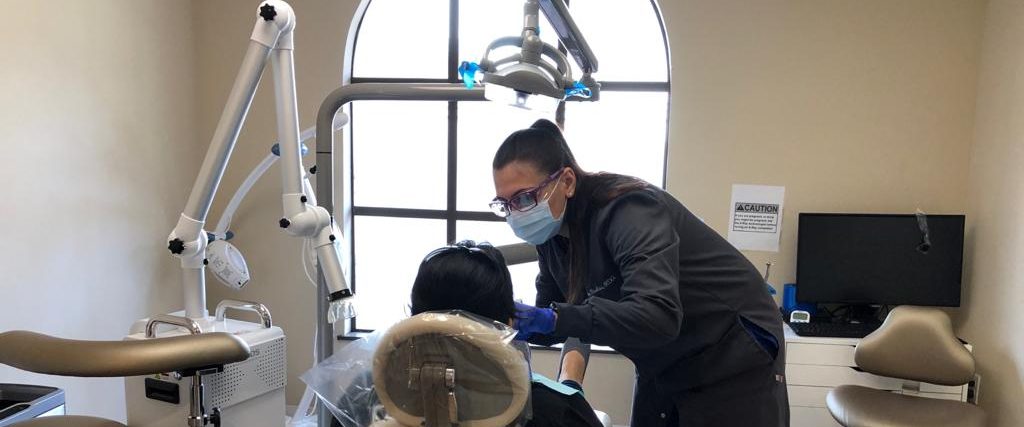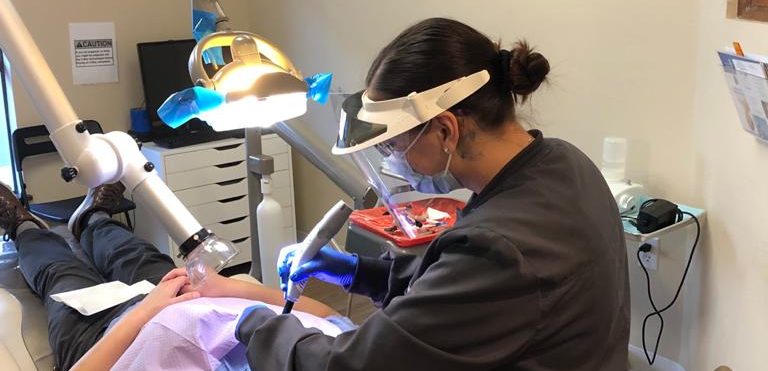Date : 25/06/2020
If you want (or need) to restore your teeth or fix your smile, you have two great options: veneers vs. crowns. Although both options can give you a more beautiful smile, there are differences between the two. Each has risks and benefits.
Both veneers and crowns are forms of solid dental restoration. They both will leave you feeling better about the way you look and feel, and they can each improve your smile. However, the main difference between the two is the fitting and procedure to bond them to the tooth that needs fixing.
Understanding these differences will help you make the right decision about which is right for you and your situation.
Sometimes Veneers or Crown Are Necessary
When you have a chip, crack, or deformity on the exterior of a tooth, you have an option to repair it.
The dentist can fill the area with a composite material, though sometimes the issue warrants a larger project for your dentist. Then, your dentist will cement or bond a veneer or crown onto your filed down existing tooth. Before your dentist places your veneer or crown, he'll have to do more grinding and filing.
The more extensive damage done to a tooth usually requires a crown.
But what are the main differences and benefits between porcelain veneers and crowns?
Reasons for Veneers
There are several issues that may make you want to consider veneers. As we've mentioned previously, the main issue is whether or not you're looking for purely cosmetic improvements.
If your teeth are fairly healthy but you're just trying to make your smile prettier, veneers may work for you.
Some of the issues that can be corrected with veneers:
- Cosmetic restoration
- Discolored teeth
- Simple cracks
- Minor alignment adjustments
- Minor chips
If you're looking for repair work, your dentist will probably recommend that you go with crowns instead of veneers.
Reasons for Crowns
Dental crowns are a ceramic or stainless and porcelain combination that fit over your tooth. They can fix every problem from cosmetic to alignment issues of your bite. They make your teeth function better and can fix your problems if you have had any trauma causing large cracks and decay areas. Your dentist will grind down your existing tooth and place a crown.
It takes longer to get a crown but is an option that lasts several years longer than a veneer, which can wear out in just seven years. Sometimes if decay is terrible, you may need a root canal, and this will require a crown.
Some of the problems that can be fixed with crowns are:
- Larger repairs
- A sizable crack
- Large chip
- Severe alignment issues
- Tooth needs full repair; doesn't need a root canal
Insurance Coverage and Cost of Veneers vs. Crowns
Veneers are not usually covered by dental plans and are a full out-of-pocket expense because they're a cosmetic solution. Dental insurance plans typically don't cover cosmetic dentistry.
However, most dental insurance plans cover at least a portion of a crown. Some plans may only cover the portion of one or two crowns per year, though, so it's important to plan carefully with your dental care provider. Although a lot of the cost is an out-of-pocket expense, some of the cost will be covered because they are for both function and aesthetic purposes.
Furthermore, some dentists will give you a discount depending on the amount of work you need to have done. Not only that, many dentists offer payments plans or CareCredit, a medical financing option.
The best way to know what your dentist can work with is to simply ask them.
Veneers vs. Crowns: Which One Is Right for You?
If your tooth issue is fairly extreme or you have badly damaged teeth, you will need a crown. If your issue is purely cosmetic and involves primarily your front teeth, consider a veneer.
Both veneers and crowns are permanent, but veneers only last about seven years. Consider the options carefully, as it would be more money and time in the dental chair if you make the wrong decision.
If you're concerned about your bite, consider a crown. A crown is practically an entirely new tooth. If your goal is to save as much of your tooth as possible, a veneer is a better option. However, if your tooth needs to be ground down to save, a crown is a good long-term fix.
Issues to Consider When Choosing Veneers or Crowns
Whether you choose veneers or crowns, there are some important issues to keep in mind.
After fitting, you can only have minor adjustments
Usually, you can fix minor issues with finer drilling or polishing. However, once your dentist lays cement for a veneer, you lose the option of more complicated adjustments because veneers are so thin.
With a crown, you have more room for adjustments and grinding if your bite is slightly off after installing the crown.
Good oral hygiene is essential
If poor oral hygiene caused your serious dental problems, getting veneers or crowns won't fix your problems unless you develop better oral hygiene habits. This includes brushing and flossing at least twice daily.
Make sure you eat with caution and don't eat a lot of tough foods like hard candy.
Once you have crowns or veneers applied, you can no longer bleach your teeth. Because they're fitted to match your teeth, your dentist's lab colors them before they're put into your mouth. So, if bleaching is a concern to you, maybe doing nothing is in your best interest if it is cosmetic.
Also, after the fitting of your veneer or crown, be sure to keep up your hygiene even more so you don't have more dental work down the road.
Durability of veneers vs. crowns
When you try to figure out the best option for beautifying your smile, consider durability.
Choosing the less optimal option could land you back in the dental chair if you're not functioning optimally with your choice. Veneers can last between 7 and 15 years but have less durability than a crown. Also, they are more susceptible to breaking.
If you bite your nails or chew ice, you might consider a crown instead. Remember, they are only a shell so they are easy to replace, but they don't come with a warranty. Crowns are thicker and more durable and should last longer than 10 years if you take care of your teeth.
The Preparation for Veneers vs. Crowns
Veneers need less work to make them fit on your tooth. Also, less tooth enamel is taken away from the original tooth. Your dentist will file a thin layer off of the tooth so the surface can attach the veneer easier with cement. The veneers also don't touch the back part of a tooth.
Alternatively, a crown requires your dentist to take up to 75 percent of the tooth away with a grinding tool. Then, the crown is fitted over the remaining tooth.
However, sometimes a tooth being prepped for a veneer needs more tooth shaved down, depending on the layout of your teeth.
Fixing Your Teeth
With the correct hygiene, eating habits, and care for your crowns and veneers, they should hold up for around 10 and 7 years, respectively.
They are both fairly stain-resistant but you need to still brush and floss regularly. Most dentists recommend brushing and flossing minimally twice per day.
Remember not to bleach your crowns or veneers as this could cause damage and they won't match your other bleached teeth. Also, always be mindful of the hardness of the food you're eating. This will make your dental purchase last longer and help you maintain a healthy bite and smile.
Whatever you decide, whether veneers or crowns, make sure it fixes the problem so you don't need more dental work down the road.




